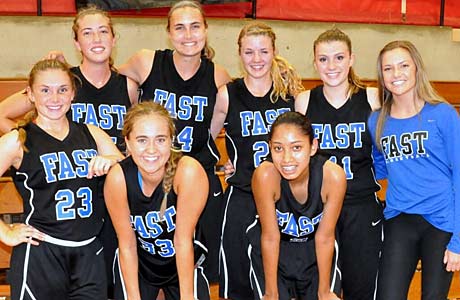
Team FAST, which has four team members from Oregon's West Linn High School, poses after a game at the End of the Oregon Trail tournament.
Photo from Twitter
Carl Tinsley must have had a premonition.
He's been running the End of the Oregon Trail girls basketball tournament for 34 years, and he's seen the event shift from being a truly national event to more of a regional one — though it's still one of the premier tournaments in the country.
One reason for the change has been the economy, but another has been the NCAA's limit on how many days college coaches can look at recruits. Teams and coaches used to have more time to get from event to event, and didn't have to cram as many games at as many sites as possible.
Now they do. With only 14 evaluation days in the summer, that pressure to expose as many young players to as many college coaches in a brief period of time caught up with the End of the Trail Tuesday.
The Cal Stars Nike Elite, which looked to have an excellent shot to be the first Northern California team to win the EOT since 1989, had to forgo even playing in the title game because the logistics of their plane flight to the next event in Chicago forced them to leave Oregon before the 1 p.m. game time on Tuesday.
In the end, the Northwest Blazers Orange took the trophy, beating Tree of Hope from Seattle, but even that matchup was yet another sign that summer basketball is much more regional than it used to be — this was the first time in 34 years that two teams from Washington faced off in the finals.
And the impact isn't limited to the tournaments — it also affects players.
"I come out here and I can see a kid maybe two games," said Jeff Walz, head coach of NCAA women's runner-up Louisville. "Maybe she hits three of six threes tonight, and three of six threes tomorrow night, and I sign her. But we've all had moments when we're awesome, and maybe we discover she's really not that good a shooter."
Walz can recall, as can many coaches, the days when the End of the Trail was the unofficial kickoff to the summer season, and all the college coaches came and watched the entire event.
"You got to see everybody, and see them more than once," he said. "It's more regional now, because you have to maximize your time. People might not want to spend the money for a day-and-a-half."
A school like Louisville has a significant budget, but others don't have as much for travel — and of course, the club teams are always scrambling.
"The economy was the first thing that affected us," said Tinsley. "The tournament still fills up, but things have changed. It used to be teams couldn't get in. We had qualifying tournaments.
"It's become a big business, and there are so many tournaments. Club teams run their own tournaments to fund themselves."
Tinsley also said the tournament isn't drawing teams from as far away as it used to and, by the same token, West Coast teams don't go east as much either.
After all, if most of the players on a West Coast club team's roster are going to go to college on the Pacific Rim, spending to money to go to Nashville, say, doesn't make much sense.
"We're from a warm climate," said Byron McCollum, coach of the Arizona Sting Blue. "And most of our girls don't want to go east of the Mississippi. Why go back east when maybe only one girl is interested?"
Scott Davis of Strictly Hoops in Northern California agrees.
"It's tough for kids to get across the country," he said. "And there are so few kids it would benefit."
Still, though, the End of the Trail is special. Around 300 college coaches spent some time in Oregon City, and all the West Coast schools were represented.
"If you're a West Coast team," said Tinsley, "you know the West Coast coaches are here."
Of course, Louisville, Tennessee, UConn, Kentucky and all the other big names were there as well. But with the time pressure, they, like the teams, have to get on the road in a hurry. And all of this scattering has also taken away from the competition between clubs.
"There's no national tournaments any more," said Tinsley. "The Nike Nationals only have 24 teams, and they're all Nike teams."
And Blazers, to name just one, are an adidas team, so they can't play at the Nike Nationals.
Speaking of the Blazers, this was their first-ever win at the End of the Trail, which meant something to long-time coach Stephen Klees and his top player, Brittany McPhee, and it will mean something for years to come.
Jualeah Woods, who was on the championship North Coast Express team back in 1989 and who now coaches at USC, still hasn't forgotten.
"Every time I come to this tournament," she said, "it takes me back."
Back to a time when the summer scene was different, and more national in scope.